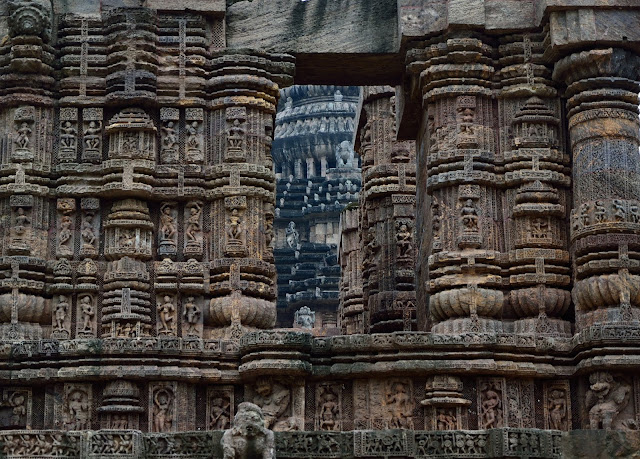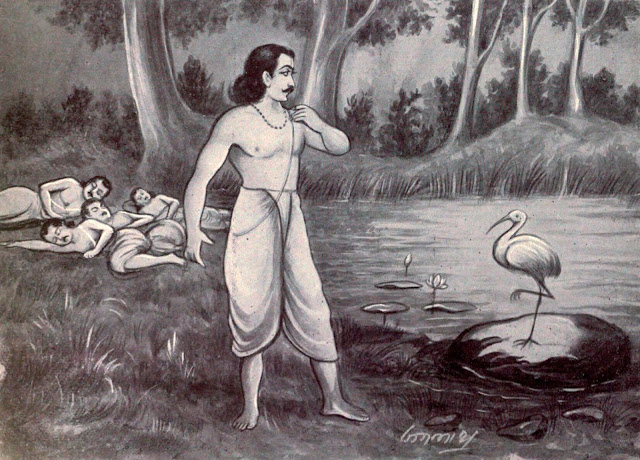Reading Notes: The Life of Buddha, Part C
 |
| Photo Source |
Chapter 15: The Doctrine of Arata Kalama
Siddhartha
enters the tutelage of the holy monk Arata Kalama. Soon Kalama approached
Siddhartha and told him that Siddhartha had learned all that he could from
Arata and suggested that the disciple become a teacher with Arata and they
could split the duties of teaching. Siddhartha considered the penitence and
austerity that the monk and his disciple practiced. He determined that, despite
their holy regime, they would never offer humanity a higher place spiritually.
For this he decided to not join Arata and rather left to meditate on a
mountain.
Chapter 16: Siddhartha and King Vimbasara
Siddhartha wondered into the city of Rajagriha to beg for
food. While walking through the city, all of the people noticed how handsome he
was. News spread to the king. King Vimbasara, who reigned from Rajagriha, heard
the news and had Siddhartha followed to see where he resided. Then the king
rode out on his chariot to Siddhartha’s place of meditation on the mountainside
and offered him a place in his palace. Siddhartha declined. The Kin, after
learning where Siddhartha came from, asked the hero to teach him how to reach
enlightenment once the hero had learned. Siddhartha agreed. The the hero sought
the lesson of the monk Rudraka and found that his teachings where no better
than Kamala’s. Siddhartha left Rudraka when several of the disciples now following
him.
Chapter 17: Siddhartha Deserted by His First Disciples
Siddhartha meditated beside a lake for many years. His
contemplation was so deep, many thought he was dead. He became thin, gaunt, and
frail. Nearly withering away he choose to seek nourishment and began to eat
more. Because he choose to eat, his disciples assumed he was no longer seeking
austerity so they abandoned him.
Chapter 18: Siddhartha under the Tree of Knowledge
Siddhartha is offered a milk in a golden bowl by a girl who
was helping him. Recognizing that all Buddhas before him had been given a gold
bowl on the day they where to become a Buddha, he tossed the bowl into the
river and declared that, if the bowl moves upstream he will become a Buddha
that very day. The bowl moved upstream and then fell into the underworld where
it made a sound as it fell into all the other gold bowls that had been thrown
away by other Buddhas. Siddhartha went to the tree of knowledge, threw grass on
the ground that turned into a comfortable chair and declared that he would not
leave until he had gained enlightenment.
Chapter 19: Mara’s Defeat
Mara attempted all measures possible to attack and impose
fear on Siddhartha, but all efforts were repeal. Eventually Mother Earth
proclaimed that Buddha was greater in strength and generosity than Mara and so
Mara was defeated.
Chapter 20: Siddhartha becomes the Buddha
Siddhartha
contemplated before the tree of knowledge and came to this conclusion.
Ignorance lie at the root of death, of old age, of suffering, of despair. To
suppress ignorance is to suppress impression. To suppress impression is to
suppress perception. To suppress perception is to suppress name and form. To
suppress name and form is to suppress the six senses. To suppress the six
senses is to suppress contact. To suppress contact is to suppress sensation. To
suppress sensation is to suppress desire. To suppress desire is to suppress
ties. To suppress ties is to suppress existence. To suppress existence is to
suppress birth. To suppress birth is to suppress old age and death. To exist is
to suffer. Desire leads from birth to rebirth, from suffering to further
suffering. By stifling desire, we prevent birth, we prevent suffering. By
leading a life of holiness, desire is stifled, and we cease to endure birth and
suffering.
With that realization, Siddhartha became Buddha and the
world rejoiced.
Bibliography:
Andre Ferdinand Herold, The
Life of Buddha, http://sacred-texts.com/bud/lob/lob03.htm#page_3


Comments
Post a Comment